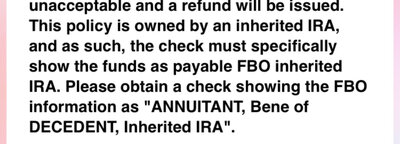- 4,886
So as long as he rolls over the $188,000 into another qualified account, will he only be taxed on the $100,000 that he keeps as long as he rolls the $188,000 within 60 days?
Correct. A spouse bene has the right to use the 60 day rollover. A non-spouse cannot use the 60 day rollover option. The current plan 1099 will still report 288k taxable to IRS. The client will then have his CPA report that 188k was rolled into an IRA within the 60 days, thus only causing 100k to be truly taxable. Try to talk him into having his CPA run the #s to show him how bad the taxes (and possibly Medicare premium increase) will be from keeping 100k instead of possibly just taking 25k over 4 years.
Also, no matter how many IRAs a person owns, only 1 60 day rollover per year is allowed by the IRS now. It changed a few years back.
Ideally, if he can get the current IRA custodian to cancel the lump sum distribution death claim election & change it, it would be best to avoid the full 288k 1099 in the 1st place and start over with a better death claim choice for what he wants & needs
Last edited:

